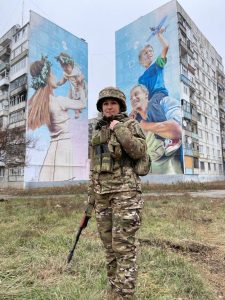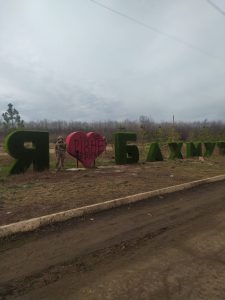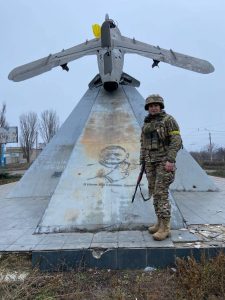"They mine houses without any military purpose, but to cause damage"
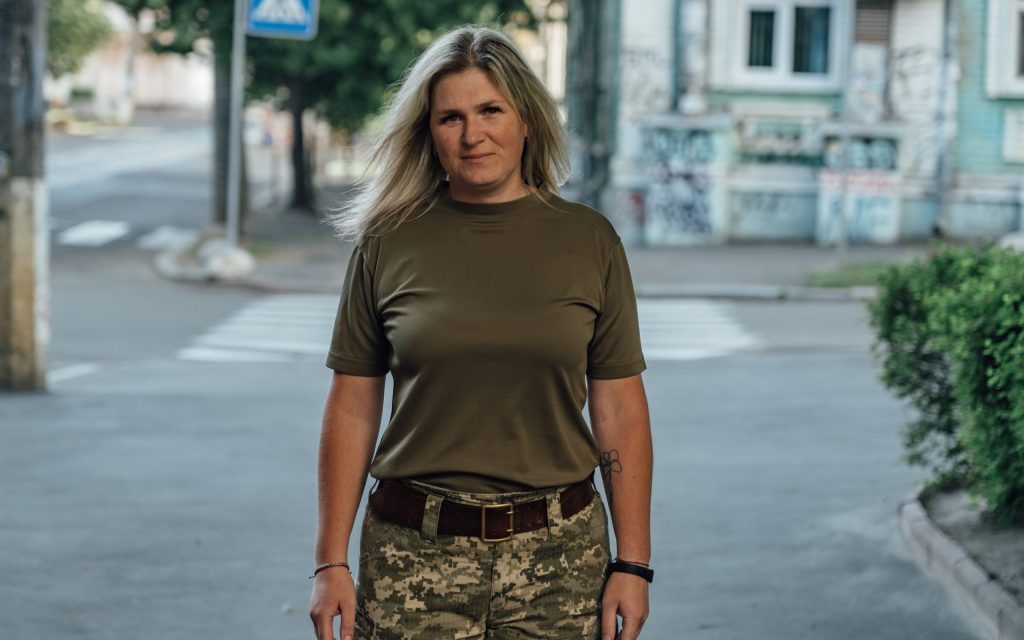
Junior Sergeant Yulia, call sign “Romashka”, commands an engineer unit of the Ukrainian Armed Forces Support Force. She has been in the army since 2020. Before that, she served as a police detective for 9 years. She met the large-scale war in a military unit in her hometown in the north of the country. She demined the Kharkiv region liberated from the russians. In winter, she spent three months in Donetsk region. Now she has a second rotation near Bakhmut.
We are talking before a TV broadcast in which Yulia will talk about the joint initiative of Come Back Alive and Kyivstar, We Live Here, to raise funds to provide sappers with transportation and necessary equipment. On the same day, she will return to the front line to her unit. Below is Yulia’s direct speech about the war and overcoming its consequences:
— When I served in the police, I wanted to go on a rotation to the ATO in Donbas. I was not accepted. They said girls were not allowed. I joined the army as an ordinary soldier. In a month I completed a basic training course for soldiers, and in two more months I received a specialization as a mechanic-driver and operator of an engineering fence machine. I worked on equipment weighing 44.5 tons. At first it was scary, but then I liked it. I have been serving as a sapper since 2021. I studied for two more months for this.
I met the large-scale invasion of russia in my military unit in Chernihiv region. We were defending our hometown. I managed to get on a combat mission twice, and then I was engaged in logistics. The guys went on missions, and I made sure they had charged radios and dry rations, and controlled coordination with other departments of the unit.
Near our city, russians were heading from Sumy region to Kyiv. In the home region, everyone has a godfather, a brother-in-law, or relatives in a nearby village who provided information all the time: where the enemy was and how many of them there were, where they were moving. Our guys set traps on the roads that the enemy could use to advance. They destroyed a lot of enemy equipment in this way, captured tanks and other “armor”, KamAZ trucks with ammunition.
There were two women in my unit at the time — me and a medical girl. The guys never had any questions about my professionalism. I know my job well.
I worked on demining in artillery depots in the village of Druzhba, near Ichnia (on October 9, 2018, a fire broke out in the warehouses of the sixth arsenal of the Armed Forces as a result of sabotage. 95% of the ammunition — over 60 thousand tons — detonated. The explosions lasted for almost a week. We had to evacuate 12.5 thousand local residents — ed.)
We were neutralizing unusable shells that had been scattered by the explosions across the entire territory of the artillery depot (about 682.6 hectares — ed.). We put the ammunition in a pit and buried it to reduce the noise of the explosion. Another sapper helped me — he twisted the wires, connected everything. And when the explosion was supposed to take place, there was a malfunction, it didn’t work. The guys had to manually dig up the shells with shovels to redo everything. I was very worried about them, because an explosion could have happened at that moment. After that, I said I didn’t need any help, I would do everything myself. That incident taught me to rely only on myself.
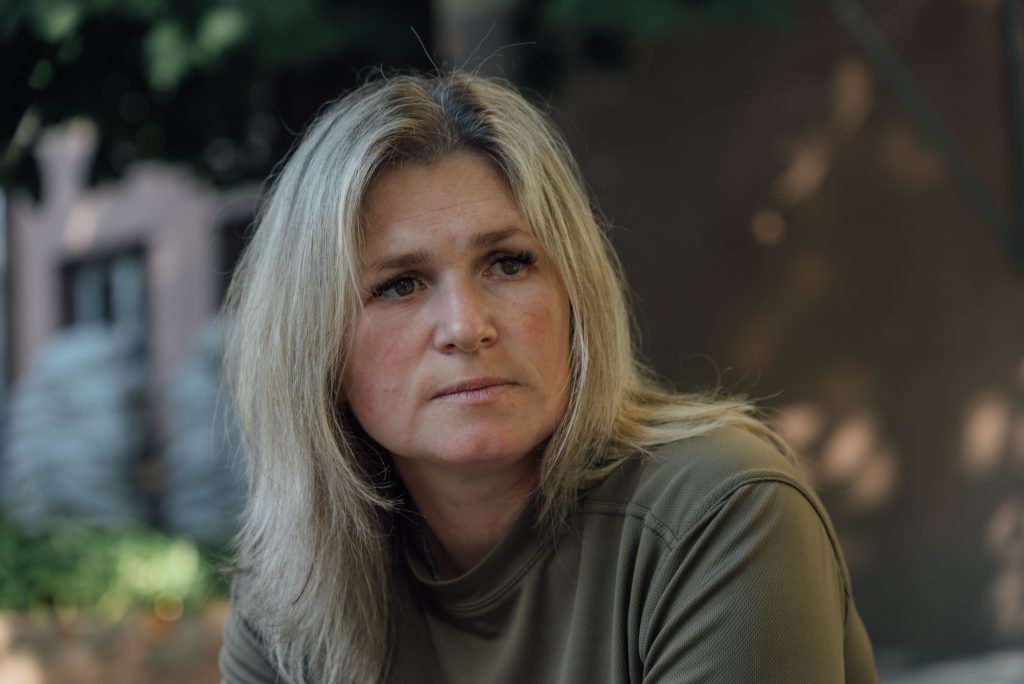
Last fall, I was promoted to the position of senior sapper of the group. We went to demine the de-occupied Kharkiv region for almost three months. We returned and a week later went to Donetsk region. We worked in the area of Bakhmut all winter. After that, I became a group commander. Now we are again providing passages for our fighters, creating obstacles for the enemy’s movement near Bakhmut. The sappers of the Support Forces are assigned to different brigades, which also have their own specialists, but they are not enough – the line of coverage is too long.
First of all, we worked on infrastructure so that we could restore electricity to villages that had no electricity or gas. Winter was coming
In Kharkiv region, we worked in Balakliya. We were checking civilian infrastructure facilities: boiler houses and schools. In the city itself, it was mainly the State Emergency Service that was clearing mines. We mostly worked on the outskirts. First of all, we dealt with power lines so that we could restore electricity to the villages that had no electricity or gas for six months. Winter was coming, and they were cooking over fires. There were also mined power lines, and unexploded shells were found under the wires cut by shrapnel.
Russians deliberately shot transformer boxes and blew up posts to cut the wires. They live like in the Stone Age and want us to live like that. They literally do not understand what it is like to have electricity and gas in the village. They didn’t know how to use an electric stove and cooked their food on fires in the yards.
Minefields are laid without any logic
At first, there were very few people in the liberated villages. Some people came up and thanked us. Or they asked to check the houses of, for example, ATO soldiers. It is a standard practice of the enemy to mine civilian homes to cause as much damage as possible, without any military sense.
The sapper work of the russians that I saw does not indicate any super level of their professionalism. They lay a lot of anti-tank minefields, sometimes without any logic. It seems that they had a lot of mines, so they scattered them.
They are massively using anti-personnel mines, OZMs (OZM-72, anti-personnel fragmentation mine of circular destruction — ed.). There are a lot of PFMs (anti-personnel landmines), also known as “Petals”, prohibited by international conventions. They shoot them in cassettes, hundreds of them. These munitions are small, green or brown, so it is difficult to detect them in the grass without a metal detector. They are triggered when you step on them. This is how fighters mostly lose limbs. To get these mines, we make a special device: we string cut plastic bottles on long sticks. We put them in a pile and set them on fire from a distance, the plastic “Petals” burn, and the fuse inside them can work.
Four civilians were killed in one forest. People are aware of the mines and continue to go to pick mushrooms and fir trees
The occupiers were cunningly mining the approaches around their positions. We tried to clear as much as possible. However, the territory under occupation was large. We only had time to examine some of it. We fenced off such places and warned people with signboards that they could not go there: there were mines. We also talked to people. But they did not pay attention and went to pick mushrooms, in winter – to collect fir trees. In nearly three months that I was there, four civilians were killed in one forest, and many more were injured. And people know about it and continue to go there, even taking their children with them. I do not understand this.
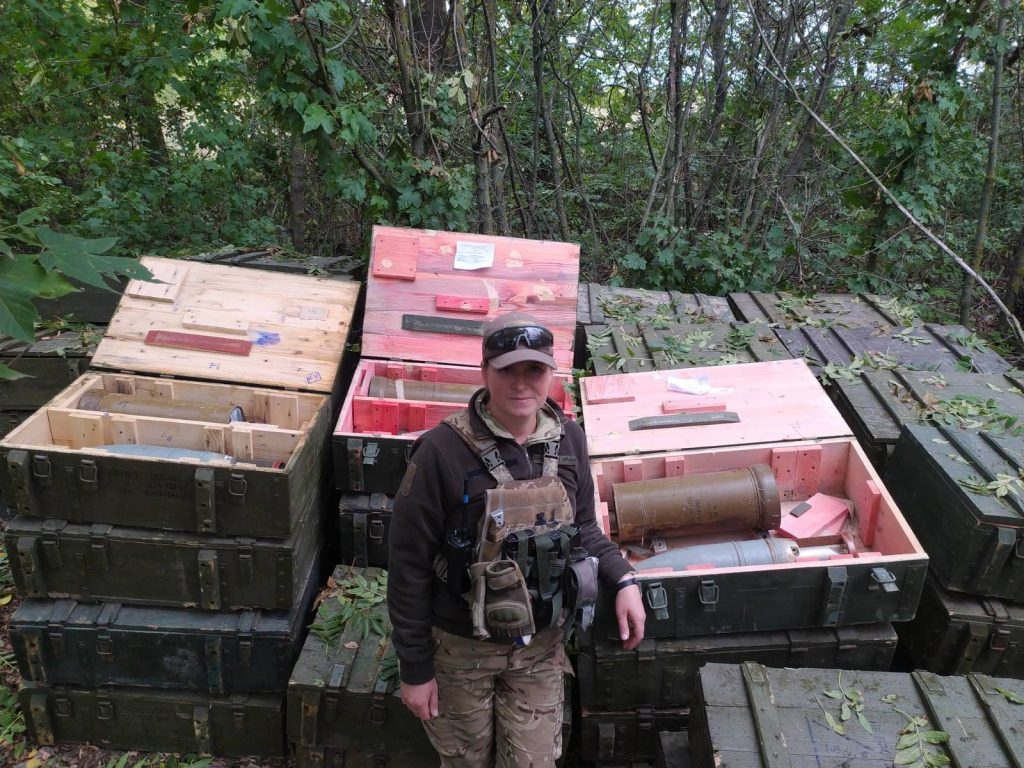
In Kharkiv region, for the first time, we were dealing with anti-tank mines with plastic rather than metal bodies. They have only a small striker and a spring made of metal. If such a mine is slightly buried, not every mine detector will see it.
Once we met two volunteers from Kirovohrad region near Bakhmut. They were delivering aid to civilians and got lost. At that time, the cannonade in the city lasted around the clock. “If my husband knew where I was, he would have killed me,” one of them joked. We went to guide them. We got to the indestructibility point. There was a woman there who took us to the basement where the locals had been hiding for months without electricity and water. I remember a boy of about 10 years old was there.
In winter, it was hell in Bakhmut. At the same time, the local market was working
Even in winter, when it was hell, hundreds of civilians stayed in Bakhmut. There were no five minutes when you didn’t hear something flying or exploding somewhere. At the same time, the market was working, it was full of people.
Some of those people did not want to start a new life elsewhere. Others left, tried it, and came back. Sometimes I think: what happened to them now? Did they go to russia? Did they die? I’m afraid that after the city is liberated, we will learn a lot of terrible things like what happened in Kharkiv region.
It’s painful to see the video of the ruins of Bakhmut. All those landmarks are gone: the airplane, the two houses with murals, the inscription “I love Bakhmut”. There are only photos left.
We had to fight for Bakhmut as much as we could. If we had retreated, the same would have happened in Kostyantynivka, Druzhkivka, Kramatorsk.
Our infantry is doing incredible things. They are unique people. In some places, enemy positions are 30-50 meters away. They curse at the russians, and they hear them. It takes a lot of willpower to stand there.
Sapper work is incredibly interesting. It either suits a person or not. Whether it’s yours or not becomes clear during training. It’s not enough to just memorize formulas, terms, and work algorithms. There must be calm confidence and even pleasure in the process. Otherwise, it’s not worth doing. If you are afraid, you are unpredictable and can endanger the whole group.
I like to clear mines. I have fun when I press a button and it goes bang, scatters, the ground trembles under my feet.
You have to be careful at every mission, just like the first time
No matter how much experience you have, you can never relax. At every mission, you have to be as careful as if it was the first time. You have to pay attention to everything, even when you are just walking: look at your feet, at the level of your knees and chest, because there may be tripwires. There were no casualties in our unit, no sappers blown up, thank God.
The most dangerous period, the greatest risk, is when a person gets used to it and becomes less attentive. That is why we work in rotations: three months in the combat zone, three months in the permanent dislocation point.
Some of our colleagues went to the Czech Republic and Denmark for training. In general, they teach the same things as we do. Safety measures for handling ammunition are the same everywhere. What’s different is, for example, the algorithm of actions after finding explosives. They have to report, draw up a neutralization plan, etc. We don’t have time for that. We come, put a TNT grenade, detonate it and move on. If we put together a pile of papers for each munition, our demining will never end.
As part of the We Live Here project, we are raising UAH 175 million to provide transport and necessary equipment for 146 engineering and demining groups of the Ukrainian Armed Forces Support Force to speed up demining in the country and protect the defenders who are engaged in it. You can make a contribution on the initiative’s website or by transferring funds to a separate “piggy bank“. Join in!
